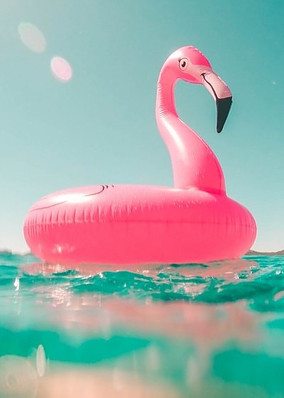
The short answer to this question ‘Does chlorine aggravate eczema?’ is: YES. Most eczema warriors see a worsening of their symptoms when exposed to chlorinated water. But there is a small minority who do better with chlorine.
What is chlorine?
Chlorine is a chemical disinfectant, unstable on its own, so in its natural state, it is usually combined with other elements. One example is sodium chloride (table salt).
Chlorine is used in our drinking water to kill pathogens like viruses and bacteria. This has significantly reduced the occurrence of waterborne diseases, which can be deadly in many cases. It is also used in swimming pools and spa facilities, as a first line of defence against germs.
Chlorine features widely as a disinfectant for healthcare facilities, as well as in household and industrial cleaners. It can sterilise kitchen and bathroom surfaces, and as a bleach, it can whiten and disinfect cloths too. More information can be found here: www.chemicalsafetyfacts.org.
How does chlorine aggravate eczema?
The most common reaction to chlorine is irritation of the respiratory tract, which can lead to asthma or breathing difficulties in people who have a compromised respiratory system. But how does chlorine aggravate eczema? That will be through drying of the skin, worsening the itch and inflammation, or causing hives to develop. Read more about chlorine sensitivity here: acaai.org.
How does chlorine help with eczema?
For the lucky minority of eczema warriors who do not get irritated by chlorine, exposure to chlorine water can actually improve their skin, as it kills the bacteria that could possibly be residing on the skin.
So in this sense, chlorine is actually beneficial to us in cleansing our skin, provided we have the remedies to cope with the dryness and itching afterwards.
Kids need to play in water
Playing in water is one of the most fun things on Earth. No kid or adult with a young heart should have to be deprived of this joy, as far as possible.
Other options
For an eczema warrior, luck is really on your side if you have access to a saltwater swimming pool, as there are definitely great benefits of swimming in saltwater, so a saltwater pool will be your safest bet.
The second best option would be the sea, if you have easy access to an unpolluted beach, then go for it!
A chlorinated swimming pool would be the last option, if there are really no other choices. But prepare yourself, and gear up for some precautions and remedies.
Precautions if you must swim in a chlorinated pool
- Apply your regular moisturiser, before putting on another layer of sunscreen to protect yourself from the harmful ultraviolet rays. These should preferably be made from natural ingredients that you know you do not react to.
- Right after getting out of the pool, immediately give yourself a good shower to rinse away the chlorine, with just water, or also use your regular soap.
- Then, put on a soothing moisturising cream to ease the itch and dryness. Aloe vera gel works great in offering calming relief. Moogoo irritable skin balm is also our go-to in itchy times.
These are critical steps in taking care of your delicate skin, so do not skip them if you intend to spend a fun-filled day in the water.

Other ways that chlorine can enter your life
If you find yourself reacting to chlorine, then it is best to be aware of other channels through which chlorine can sneak up on you.
- bath water – the tap water that you bath in is most likely chlorinated. If you react to chlorine in the swimming pool, then your skin may be just that bit unhappy from having to face the tiny amount of chlorine everyday from your shower or bath water. It does not get a break, so this can add on to the stress that your immune system is dealing with. Install a shower filter to resolve this issue.
- drinking water – if you are sensitive to chlorine, your body may be in a chronically low inflamed state because of daily exposure to that small amount of chlorine in your drinking water. It is a necessary evil in order to protect public health. But your kidneys and liver may have a hard time processing it, which stresses your elimination system, and is very detrimental to your health. So at the receiving end, you could install a filter to your tap, or buy a filtering pitcher. Another option is to drink from bottled water, but that may be rather expensive.
- cleaning agents and bleaches – chlorine features prominently in household cleaning products with disinfecting and bleaching properties, mould and mildew removers is one example. Make sure you gear up before using any of these products, by wearing long sleeves, and putting on gloves. Latex is another common allergen, just be mindful about this when using latex gloves. If not, plastic ones will do just as well. Always wash your hands thoroughly after the cleaning job.
Final thoughts
Many people have used bleach baths as an effective natural remedy for their eczema symptoms. Household bleach contains sodium hypochlorite as the active ingredient. It eliminates bacterial colonisation on the skin, especially that of staphylococcal bacteria. So it reduces inflammation due to the infections. But it is not for everyone, just like any other remedy, as some people’s reactions to it far outweigh the benefits of infection control, or there was no issue with infection to start with, on their skin.
So does chlorine aggravate eczema, or does it help eczema? Chlorine can cause drying and itching skin for many people with eczema, so take the necessary precautions if you are swimming in a chlorinated pool. But if you have found chlorine to help ease your eczema symptoms, then get out there into the pool more often, as the sun also benefits eczema skin tremendously, with all the vitamin D it causes your skin to produce. Lastly, also know that for any individual, the sensitivity to one substance may change over time, as his or her health, diet and lifestyle changes.

Eczema is a terribly irritating thing to suffer from. My husband has it on his arms, and he can scratch and scratch until he is raw. The only thing that seems to ease it for a while for him is a swim in the sea. It must have something to do with the salt water.
Reading your article, I am thinking maybe its the chlorine in the tap water that is aggravating it more. But how does one avoid this, as he does need to shower daily. I think maybe a filter on the tap to remove the chlorine may be just the answer.
Hi Michel,
You’re right, salt water does help to relief eczema symptoms for many people, this article that I’d written on salt water and eczema may interest you.
Yes, a shower filter would do a good job in removing chlorine from tap water. You could explore that option.
I’ve been getting a bit of eczema lately and summers just coming around the corner for us meaning more trips to the pool. Chlorine doesn’t help with my eczema, but hopefully using the moisturiser before and aloe vera gel after will help me out. It’s nice to avoid using a steroid cream whenever possible.
Thanks for the good read!
Hi Terri,
Yes definitely avoid steroids whenever possible, use them only in life-threatening situations. And like you said, before and after protection will allow your skin to benefit lots from the sun. Enjoy the swims!
would you recommend swimming in the pool full of chlorine water? Some parts you said that it can help and some parts you say it can aggravating the eczema symptoms. I love swimming. If it is bad I have to hold off swimming till I am fully healed. Maybe I will bandage it with a waterproof plaster.
Hi Kit,
The thing is, there are always two sides to a coin. Like I mentioned at the start of the article, chlorine aggravates eczema for most people, while for a small minority, they feel that chlorine actually provides relief. So I try to provide a balanced view, as the same thing can have different effects for different people.
I would suggest that you give it a try, but do remember to have a quick shower to wash off the chlorine after your swim, and moisturise straightaway, with some cream that you know works for you.
If chlorine irritates you, you can try swimming in the sea, if you have a nice and clean beach that is accessible to you. If not, you could try having your own salt water bath at home.
I think I’m one of the few that actually see improvement of my skin after I went swimming. Not the first time, but if I go swimming for 2 times a week, after the second time I notice that the redness is far less. I never could put a finger on it, but thanks to your article I know why.
Hi Jurgen,
Yeah you’re rare, not many people take chlorine on their skin well. Hang on to this knowledge so that you know to turn to the pool when you need to.
My wife suffered of Eczema and she sometimes experienced that exposure to chlorine (at my mother’s pool) would aggravate her Eczema. However, it has decreased over time that I’m not sure how much effect chlorine has. As you mentioned, I’m sure that showering right away (which is what she usually does) can be a reason why her Eczema doesn’t get worse after getting in the pool.
Hi Victor,
I’m glad your Wife has found showering to be effective in removing the irritating effects of chlorine, and continues to get some exercise and sun in spite of her eczema.
My daughter has suffered from Eczema her whole life so I can attest to the absolute number of things that can affect it. We actually had to change our pool water from Chlorine to Salt so that she could swim in summer and we used to put salt in her baths whcih seemed to help also. We also had to do her laundry in Lux baby flakes for a long time.
The best thing we found for her in fact was to take her to the beach and get her into the ocean, dry her off and add some specialised moisturiser on the trip home. that actually used to clear it for a few days.
Thanks for the article
Paul
Hi Paul,
Wow you did so much for your Daughter – changing the pool water from chlorine to salt must have been a big task! Yes we so love the sea too, but in some areas it can get quite polluted. So salt baths, like you mentioned, are still the most reliable for us too.
Hope your Daughter is healing well from her eczema.
Wow, this article has been a huge eye opener for me. I’ve always heard that chlorine is bad for people with eczema. It cause irritation and dry skin. I didn’t know a small minority of people can benefit from chlorine. That’s unheard of. Weel,I just learned something new today. After reading your post. Everything is making sense now. Thank you so much for sharing this awesome post.
Hi Hong,
I’m Glad you found the information here useful.
Stay well!
My daughter had mild eczema when she was younger but fortunately, she grew out of it. Nowadays, we swim weekly in the pool. The chlorine does not give us much problem as we go to the shower immediately. But I have to say that the smell is not pleasant and leaves a terrible taste in the mouth. Made worst when somehow the chlorine content is much higher. You have provided very good information here and will surely benefit many people reading this.
Hi Sharon,
It’s fantastic that your Daughter has outgrown her eczema!
Yes, showering right after Swimming in a chlorine pool will definitely help ensure that the skin doesn’t get irritated.